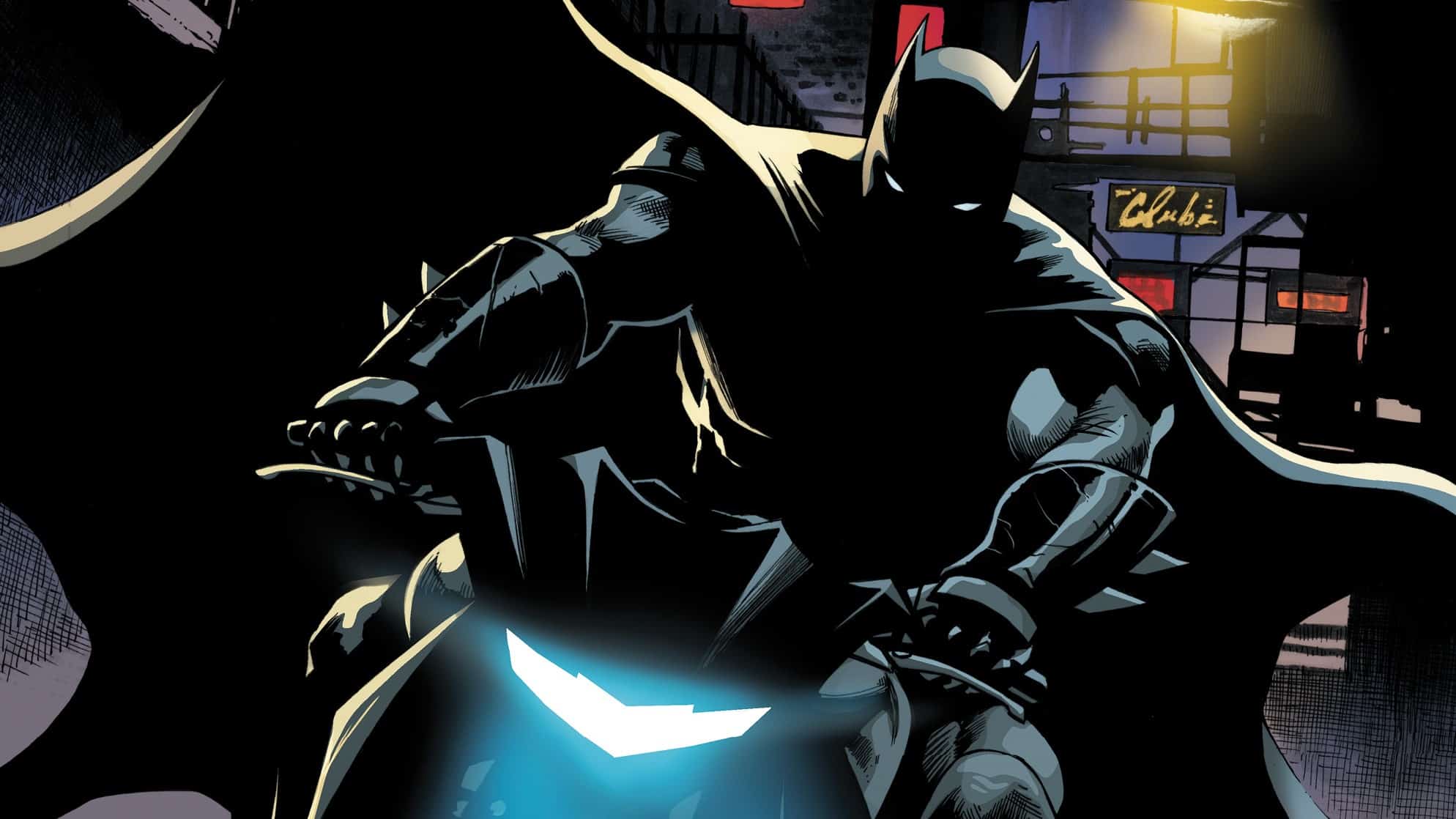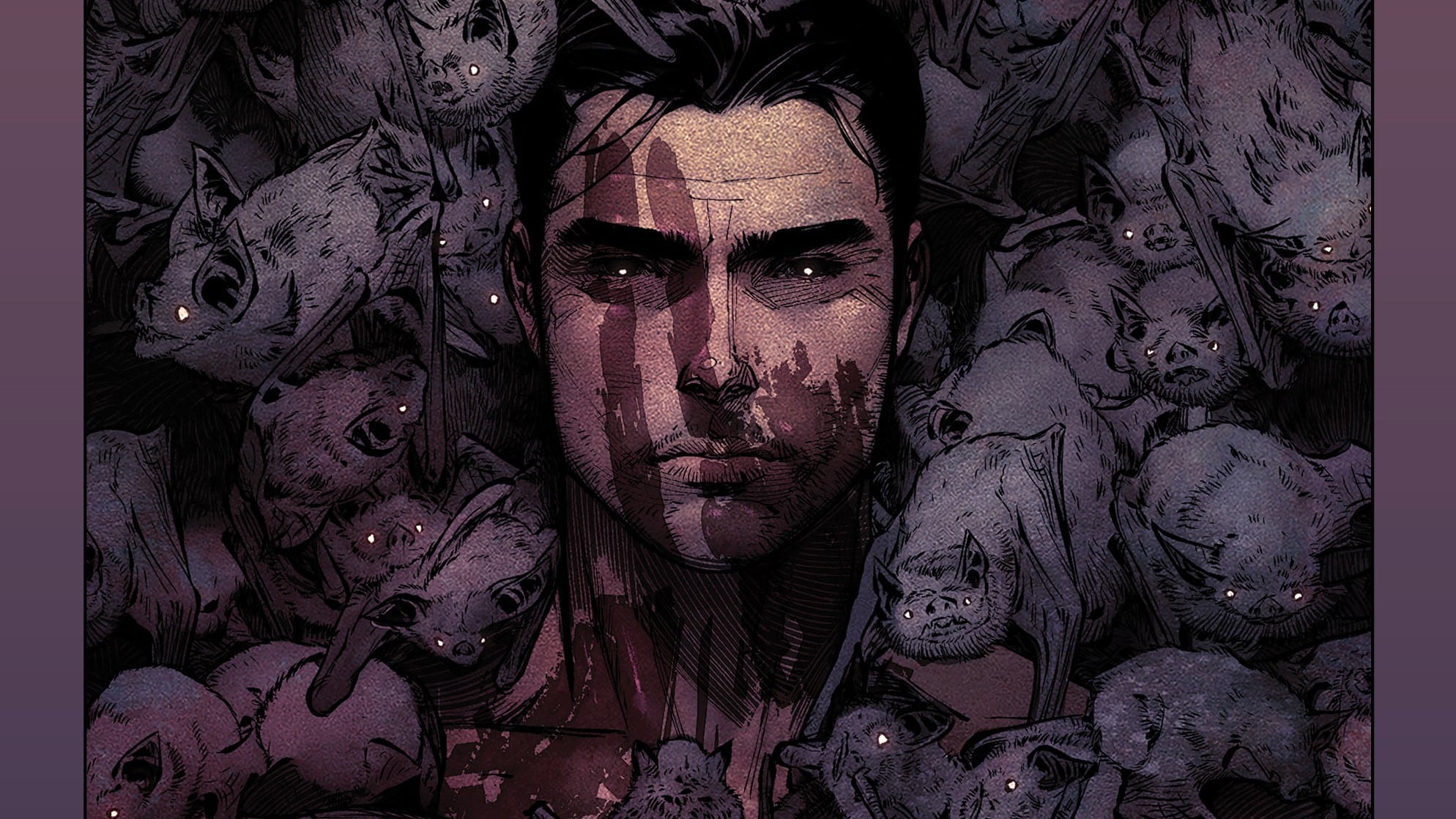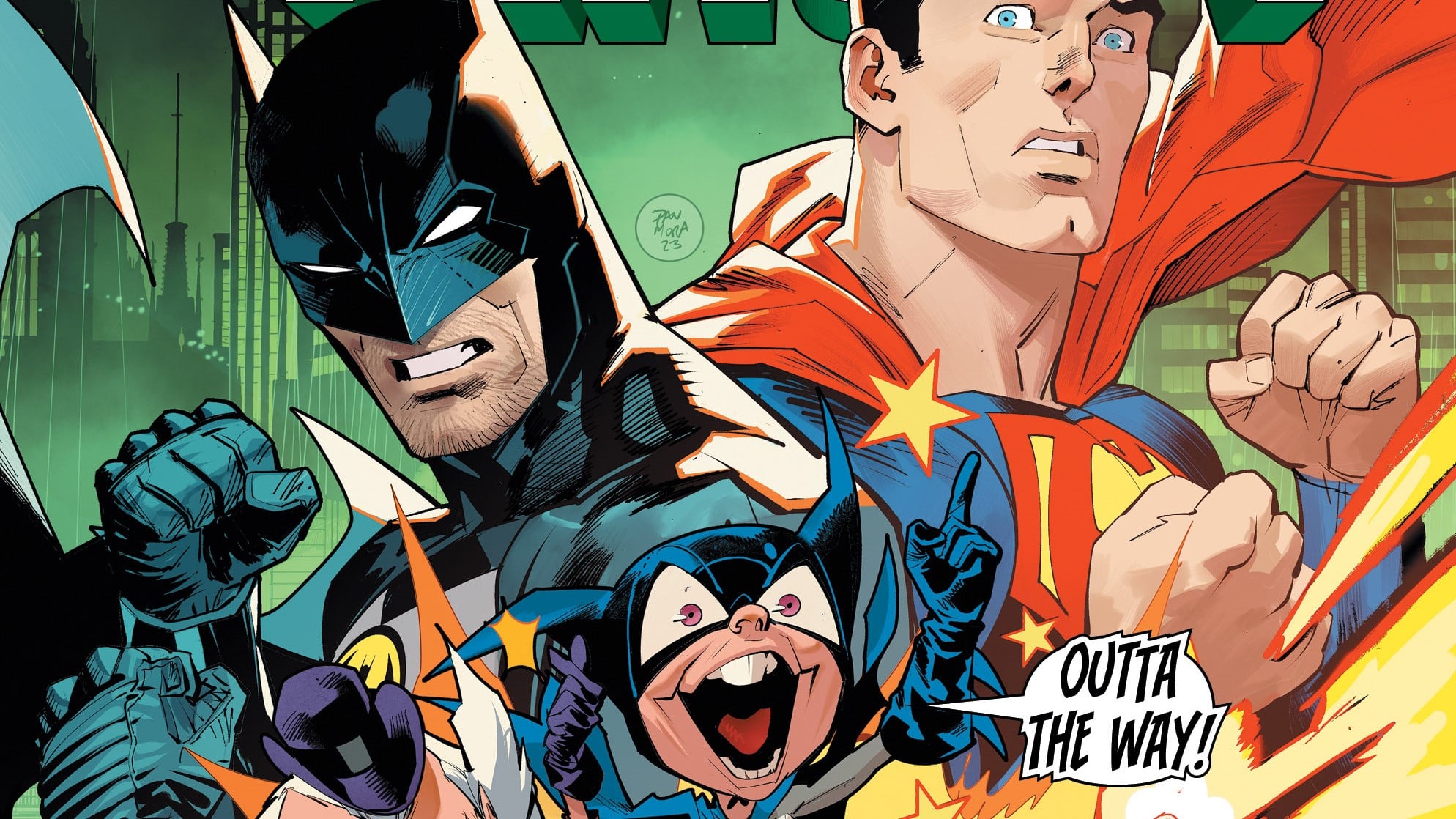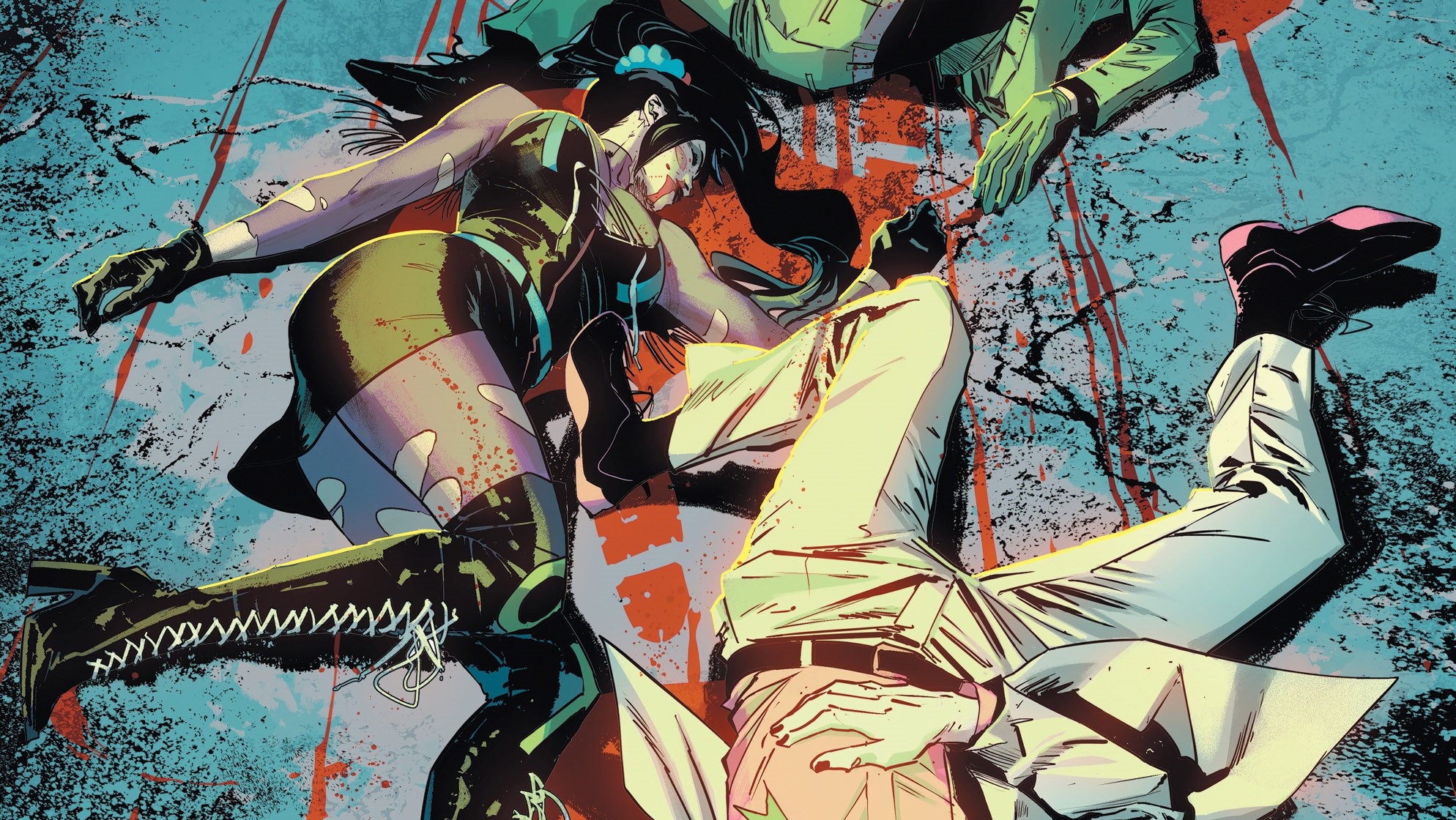Jace Fox teams up with the Question to find out who killed Anarky while Tiff Fox tries to find her place in her new life in I Am Batman #12, written by John Ridley, drawn by Christian Duce, colored by Rex Locus and lettered by Troy Peteri.
Batman: Urban Legends #18 starts its next serials, with a Signal and the Outsiders and an Alfred serial, and three one-offs: a Batman and Robin (Tim Drake), a Batman and the Demon and a tale of small-time Gotham crooks making good.
After the events of Arkham City: The Order of the World, Jean-Paul Valley has fled Gotham to try to find peace without Azrael. But a young woman and a new foe with ties to an old one are going to pull him back into the role of the avenging angel in Sword of Azrael #1, written by Dan Watters, drawn by Nikola Cizmesija, colored by Marissa Louise and lettered by Hassan Otsmane-Elhaou.
Matt Lazorwitz: A lot going on this week. No time to banter: let’s do this thing.
Will Nevin: This might not be the best week of books we’ve ever had, but there’s a Bat-ton of stuff to talk about, isn’t there?
Questions and Answers

Matt: So, this is not a dig on this comic, but after reading it, I am beginning to wonder: Is this the last non-action-oriented title in the Batman line right now? We went through this entire issue without a major fight scene, and the same can be said for most of the previous issue as well.
Will: As a concept, as an idea, I’m not complaining since you can’t do much detective work when you’re dodging bullets or engaging ruffians in fisticuffs. But as always, I seem to have gripes with Ridley’s execution — he’s got to learn at least one more way to transition from scene to scene, and the dialogue has gotta stop being so goddamned clunky. I have never, ever, ever heard someone use “cancel” in an interpersonal context (i.e. “You’re mad at me, so you want to cancel me,” as said from one non-celebrity/edgelord to another); the term grates on me* enough as it is. I don’t need Ridley making it worse.
*”Cancel culture” is not a new phenomenon in our society. It’s just a new phrase for people to cling to who are also looking to escape consequences for their shitty ideas and terrible actions.
But, yes, a slower book that looks at systemic issues? I’m here for it. However, this detail work has got to get cleaned up.
Matt: And it is a book that the Montoya Question is well suited for. A faceless vigilante who is a cop in her other life? She sees things from both sides of the coin, as she points out in this issue. I’ve missed Renee in her alter ego, something that took a long time to build and was really well executed in 52. I want to see where Ridley takes Renee in his GCPD miniseries, because that’s another place he can explore these themes he clearly wants to.
Will: Speaking of themes and real-world problems, what did you think about the inclusion of a Kyle Rittenhouse analogue here?
Matt: We talked about this kid when we covered the first arc of the series on the podcast with fellow writer Corey, and it’s become more timely. That first arc came out I believe before Rittenhouse’s acquittal, so now Ridley has more to work with. The kid is obviously a shit, but for all of the clunkiness of some of Ridley’s dialogue, he doesn’t make the kid a screaming monster here. Question is able to talk him down, and he states his points, as asinine as they are, cogently. This isn’t, “People on both sides,” but it is indicating that every one of these racist/homophobic/Islamaphobic/insert-name-of-group-the-alt-right-hates-this-week-heres aren’t just rednecks who can barely read. It’s an important point to make.
Will: For me, it could have been more critical. This guy — like Rittenhouse — was not someone defending his home or his property (Ridley speaking as Jace went to the milquetoast “peaceful protest” observation, which is both not great and not smart); he traveled to do the thing he did. He’s not even a vigilante, coming in at something like a mercenary but without the pay. Or maybe the pay here is the thrill of playing soldier and getting to shoot and kill brown people. In either case, fuck this guy and fuck Rittenhouse. The concept should have been treated more harshly here.
Matt: Fair. I agree entirely with your statement at the end there. I wonder if this is editorial? Maybe Ridley went in harder and it was pulled back, either from corporate cowardice or some other reason that still boils down to the same? Ridley doesn’t strike me as a punch puller.
Will: Admittedly, I don’t know much of his work — Other History of the DC Universe is probably much more critically reflective. But I really see Jace’s thinking out loud about the balance between police and protest as Ridley expressing his own views. Or at least that’s how I read it.
Matt: Well, we’ll have to see how the stuff with Anarky and The Rest of Us activist group pans out.
We’re also really starting to dive deep into what is going on with Jace’s younger sister, Tiff, here, which is much needed.
Will: Great, now you’re making me think of the “cancel” line again. Thanks, Matt.
Matt: OK, yes, that was lousy dialogue. But the fact stands that we haven’t seen Tiff be anything other than angry and sort of petulant toward her family for this run, so now seeing her trying to do something with that anger, with this feeling like she’s not doing anything? That’s a positive step for the character, and another step on her road to being Jace’s Robin-equivalent.
From Signal to Noise

Matt: We’re at the beginning of a new arc, so instead of looking at something wider and more sweeping, like the themes or the direction of the book, can I start with something tiny and pedantic that bugged me?
Will: By all means. I live for pedantry.
Matt: In the Alfred story, he takes out a group of large, hulking cultists who are working in a fishmongers by sending an electric current through some water they are standing in, correct?
Will: Yup! But apparently it’s only a light electrocution.
Matt: Here’s the thing, and I checked this with my wife, who has worked in and around kitchens for much of her adult life and is currently the protein buyer for a food distributor. Anyone who works in a fishmonger like that, with all that water and ice around? Yeah, they have to wear skid-proof rubber-soled shoes. You know what doesn’t conduct electricity? Rubber-soled shoes.
Will: Clearly they were fake mongers — although getting harpoon neck tatts is probably committing to the bit too hard. Didn’t that come up in a book we’ve read? Batman finding a fake electrician because he wasn’t wearing rubber shoes?
Matt: Yes! The Golden Age origin of the Superman/Batman team, Superman Vol. 1 #76.
Will: Love that Encyclopedia Brown-style deduction. And that’s probably the same reference I made in the episode. I recycle, Matt. For the sake of the environment.
Matt: You are saving the planet.
Other than that quibble, which I bring up only because it’s fun to be a pedant sometimes, I rather enjoyed most of this issue. If we can’t get Alfred in the main books, at least we get him here, and it’s very much in the gentleman detective mold versus the hardboiled gumshoe one (even if the narration leans more toward the latter than the former).
And we are finally, after five years or so, moving toward some closure for Duke Thomas on his mother. That thread has been dangling for way too long. And I like Bradon Thomas’ new Outsiders concept: three original members, Duke as the new guy and a floating fifth member who is whatever hero needs backup? That is a concept that can now pop up anywhere in the DCU.
Will: Let’s talk more about Duke and his mom. The family is introduced — if I remember correctly — by Scott Snyder as Duke and his parents, who were profoundly/permanently Joker-ized in a gas attack. Duke has since become the Signal. But what have been the developments with his folks?
Matt: Not much. They have been in an institution for most of that time, and Mrs. Thomas was seemingly broken out of the hospital, leaving Mr. Thomas behind, in the Batman Secret Files: The Signal one-shot from right before “Fear State.”
Will: That information probably could have been included here in some fashion, but I don’t think it was a grievous sin to leave it out. The story was solid overall, as was the Batman/Tim Drake Robin piece. I’m sure you liked that one.
Matt: Oh, did I ever. It was a good story of Tim proving himself early in his career, and I imagine it was a coincidence that it featured Dr. Destiny, one of the main antagonists of the new Netflix hit The Sandman, even if he’s a pretty unrecognizable incarnation of the character vs. his David Thewlis-portrayed one in the show, but I’d like to believe there is some guiding hand here.
The other two stories were OK, not great. The Demon one was fun, but as we like to say on the podcast, a trifle.
Will: And full of the Otsmane-Elhaou lettering tricks I hate!
Matt: I think the final story, about two grifters taking on Gotham’s criminal elite, has huge potential as a concept, but needed way more than 10 pages for it to have a real effect on me.
Will: And yet that story came to a conclusion. Would have been fun to see it play out and for the pair to “learn their lesson” as it were.
Matt: Yes. for a book based around serialized stories, this one should have taken three to six issues, and not just one.
Will: By my count, looks like we’re only getting more installments of “Alfred: The Ongoing Story of Batman’s Butler Investigating the Theft of a Jade Earring” and the Signal story. Too bad we’re not getting more Tim Drake, huh?
Matt: Guess I’ll just have to settle for the new ongoing next month. Ah, well …
People of Gotham

Will: Brother Matt, I want to start off by saying I loved this — the story, the core concepts, the voice that Watters has developed for Jean-Paul and Azrael are all great. But I also greatly appreciated the sense that reading Arkham City and Joker matter — that everything is part of the larger fabric of Gotham and its inhabitants. Also, I don’t know how well I can keep them separated in my mind, but the one-shot is great, too.
Matt: Yes! Dan Watters writes a great Bat-related book. Here, we see Jean-Paul really struggling with Azrael. I am trying to remember if we have ever seen Azrael, the personality, so distinct from Jean-Paul himself before, to the point they can converse, and I’m not recalling it, so this is Watters’ take on the character, and I think it works. He’s having Paul dig deeper into the System, and thus is unlocking bits of being Azrael he hasn’t experienced before, so it absolutely works for me.
Will: And as much shit as I give Otsmane-Elhaou for his often intrusive “try hard” style of lettering, it really worked here. The placement of Jean-Paul’s thoughts over the voice of Azrael/the System’s commands? That was a great visual. Someone give me the tragic re-telling of the Battle of Wolf 359 from the perspective of Picard/Locutus with that same technique.
Matt: Damn, that would be something to see!
And credit to Cizmesija for his presentation of the angel Azrael in Jean-Paul’s head! That is a biblical angel as they are described (Ask another of our pals; Rob Secundus), and it is otherworldly and bizarre and something to behold.
Will: Love me some biblically accurate angels. Get fucked, Roma Downey!
Matt: I feel like this is the first book (including the one-shot) to explore Jean-Paul since his return in Batman & Robin Eternal. It’s really been focused on Azrael, so here, setting him in this placid locale, giving him the longer hair and John Lennon glasses of his earliest appearances, you can see him trying to reclaim something from before his life was blown to hell by the Order of St. Dumas.
Will: And he’s clearly sorry and afraid here with remorse for what he did in Arkham City and scared of what Azrael could do if he “comes out” again. And what better place to go with those concerns than a monastery? I tell you, Matt, there are so many smart choices made in the crafting and presentation of this story.
Matt: Up to the inclusion of the villain. Vengeance is a far more perfect foil to Jean-Paul than Bane is. She was literally programmed from “birth” to serve as a murder machine. She and he have parallel lives. And the fact that she’s working for a reborn Knights Templar instead of a reborn Order of St. Dumas is great, too. Azrael stories can only go to the St. Dumas well so many times. The Templars are similar, but with their own flavor.
Will: I’m sure Vengeance also has thoughts (or will have thoughts) on what happened between Azbat and Bane during “Knightfall.” Again, perfect use of a new character, one that (because it’s so natural and justified) proves the rule that new entries into the Batman canon should be rare and meaningful.
Bat-miscellany
- It’s Dan Grote’s turn to pick another story thanks to his generous Patreon donations, so this week? We journey to the future for three stories of the Batman of tomorrow.
- It’s always good to warn the people of Gotham: Hitchhikers near Arkham *may* be escapees.
- So, in the style of the new Pennyworth title, should Sword of Azrael instead be, “Sword of Azrael: the Continuing Adventures of Batman’s Replacement”?
- It’s hard enough to place Gotham and Metropolis on a real world map. But now we have to figure out the physical relationship between Gotham and New York? Sheesh.







